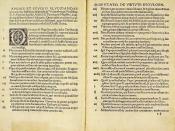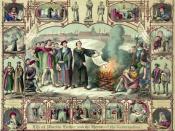Throughout the sixteenth century, Europe was plagued with both religious and political unrest. The practices and doctrines of the western Christian (Roman Catholic) Church were being directly challenged by reformers who wanted to reshape the Church to reflect their own specific religious beliefs. Particularly, the reform beliefs of Martin Luther and John Calvin soon gained widespread popularity as their ideas spread throughout the German states. Yet, as the Protestant Reformation progressed, the religious and political views and actions of each man soon determined the long term acceptance of their ideas. As a result, Martin Luther's movement failed to spread extensively beyond the borders of the German and Scandinavian states, while John Calvin's ideas gained international appeal.
The spread of Lutheranism was greatly affected by the decisions and actions of Martin Luther. Luther's actions had already appealed to many people before the establishment of Lutheranism. Such actions that appealed to many people were when he nailed the 95 theses to the door of Wittenberg Church in 1517, when he was excommunicated by Pope Leo X in 1521, and other actions that challenged the doctrines of the Church and authority of the pope.
Some of Luther's actions had also caused the restricted spread of his religion. The actions in which mostly effected the spread of Lutheranism was what he had stated in The Condemnation of the Peasant Revolt (1524) about rebellious people. This stated that Luther did not support any actions of those who were rebellious. This caused Luther to lose a large amount of peasant followers. Since Luther and King Henri VIII of England did not get along easily Lutheranism never traveled toward England. King Henri VIII of England even wrote the book In Defense of the Seven Sacraments which was an attack on Luther.
The spread of Calvinism was large...


